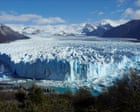
In a rapidly changing world, our environment presents both challenges and opportunities for adaptation and stewardship. From the majestic glaciers of Patagonia to the vital waterways of France, and from the crucial reservoirs of England to the stunning landscapes of the Grand Canyon, each region tells a story of transformation and resilience.
Recent studies have highlighted concerning changes in Patagonia, where the Perito Moreno Glacier, once celebrated for its stability amidst global glacial retreat, is now exhibiting signs of significant decline. Over the past seven years, this vital ice mass has lost nearly 1.92 square kilometers of ice cover, with its thickness decreasing by as much as eight meters annually. Once deemed a rare exception to the trend of glacial shrinking, Perito Moreno is now facing potentially irreversible changes. Scientists are diligently monitoring these developments, signifying nature’s delicate balance and the pressing need for global climate action.
In England, the story unfolds with declining water levels in reservoirs, where current data reveals the lowest levels in a decade. This decline, even more pronounced than during the severe drought of 2022, has prompted experts to urge for immediate hosepipe bans to conserve the precious water supply. Despite the challenges, this situation offers an opportunity for water management innovation and community awareness in water conservation practices. Embracing sustainable water usage can forge a path toward resilience in the face of climatic variability.
Meanwhile, in the United States, the iconic landscape of the Grand Canyon has recently faced a formidable challenge with a rapidly advancing wildfire. Sparked near the park’s north rim, the fire necessitated the evacuation of hundreds of tourists and campers for their safety. While the fire remains uncontrolled, efforts are underway to manage its spread, highlighting the concerted efforts of environmental and firefighting teams. Such incidents remind us of the importance of proactive fire management and responsible tourism to protect the natural beauty and biodiversity of treasured landmarks.
In France, increasing river temperatures over recent decades pose an existential risk to aquatic species vulnerable to warming waters. The average temperature of several major rivers, including the Loire, Rhône, Seine, and Meuse, has risen by approximately 1.5°C between 1980 and 2020. Active ecological restoration projects offer beacons of hope, providing strategies to mitigate rising temperatures and revitalize river habitats. By embracing river restoration initiatives, we recognize the importance of respecting and revitalizing our waterways in the face of climatic shifts.
As we reflect on these environmental narratives from around the globe, it’s clear that while challenges persist, there is an undeniable spirit of resilience and innovation in the face of adversity. Each situation, from glacial retreat to water management and habitat restoration, offers lessons in adaptability and stewardship. By fostering global cooperation and sustainable practices, we can contribute to a healthier planet and a promising future for generations to come.
Source: {link}
